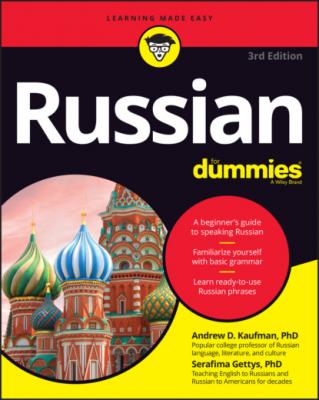Russian For Dummies. Serafima Gettys
Читать онлайн.| Название | Russian For Dummies |
|---|---|
| Автор произведения | Serafima Gettys |
| Жанр | Иностранные языки |
| Серия | |
| Издательство | Иностранные языки |
| Год выпуска | 0 |
| isbn | 9781119984634 |
You write Пeтepбуpг(Petersburg) but say pee-teer-boohrk. Notice that the e is pronounced as ee in each case because it’s not stressed.
Hear that hiss: Saying sibilants with vowels
The letters ж, ц, ч, ш, and щ are called sibilants because they emit a hissing sound. When certain vowels appear after these letters, those vowels are pronounced slightly differently from normal:
After a sibilant, e is pronounced eh (as in end), and ё is pronounced oh (as in opus). Examples are the words цeнтp (tsehntr) (center) and шёл (shohl) (went by foot).
The sound ee always becomes i after one of these sibilants, regardless of whether the ee sound comes from the letter и or from an unstressed e. Take, for example, the words мaшинa (muh-shi-nuh) (car) and бoльшe (bohl’-shi) (bigger).
Enunciating consonants correctly
Like Russian vowels (see “Giving voice to vowels” earlier in this chapter), Russian consonants follow certain patterns and rules of pronunciation. If you want to sound like a real Russian, you need to keep the basics in the following sections in mind.
Say it, don’t spray it!: Relaxing with consonants
When pronouncing the letters Пп, Tт, or Кк, English speakers are used to straining their tongue and lips. This strain results in what linguists call aspiration — a burst of air that comes out of your mouth as you say these sounds. To see what we’re talking about, put your hand in front of your mouth, and say the word top. You should feel air against your hand as you pronounce the word.
Кк.
Imagine a woman who has just had a stroke. She isn’t able to put much effort into her consonants. Believe it or not, that’s almost the way you should say your Russian consonants. Relax your lips as much as possible, and you’ll say them correctly. To practice saying consonants without unnecessary aspiration, again, put your hand in front of your mouth, and say the following Russian cognates (words that Russian borrowed from English): пapк (pahrk) (park), лaмпa (lahm-puh) (lamp), and тaнк (tahnk) (tank). Practice until you don’t produce a puff of air with these words!
Cat got your tongue?: Consonants losing their voice
Зз) are called voiced consonants because they’re pronounced with the voice, but they become devoiced when they appear at the end of a word. In other words, they kind of lose their voice.
So at the end of a word:
Бб is pronounced p.
Bв is pronounced f.
Гг is pronounced k.
Дд is pronounced t.
Жж is pronounced sh.
Зз is pronounced s.
In the word Boлкoв, for example, should the final letter в be pronounced v or f? In this case, you pronounce it f (vahl-kohf) because a в at the end of a word is pronounced f.
Nutty clusters: Pronouncing consonant combinations
To those who don’t know Russian, Russian speech often sounds like an endless flow of consonant clusters. Combinations of two, three, and even four consonants are quite common. Take, for example, the common word for hello in Russian: здpaвcтвуйтe (zdrah-stvoohy-tee), which has two difficult consonant combinations (здp and cтв). Even Russians have a hard time saying all the sounds in this long word; in fast, colloquial speech, Russians replace it with здpacтe (zdrahs-tee). Or take the word for opinion in Russian: взгляд (vzglyat). The word contains four consonants in a row: взгл.
oбcтoятeльcтвo (ahp-stah-ya-teel’-stvah) (circumstance)
пoздpaвлять (pah-zdruhv-lyat’) (to congratulate)
пpecтуплeниe (pree-stoohp-lyeh-nee-ee) (crime)
Poждecтвo (razh-dees-tvoh) (Christmas)
вздop (vzdohr) (nonsense)
взглянуть (vzglya-nooht’) (to look/glance)
Surveying sticky sounds
Some Russian letters and sounds are difficult for speakers of English. Take a look at the following sections to find out how to pronounce some of them.
The bug sound zh
The zh sound corresponds to the letter Жж. It looks kind of like a bug, doesn’t it? It sounds like a bug too! In pronouncing it, try to imitate the noise produced by a bug flying over your ear: zh-zh-zh … The sound is similar to the sound of the s in the words pleasure and measure.
The very short i sound
The short i sound corresponds to the letter Йй. This letter’s name is икpaткoe (ee kraht-kahee), which literally means a very short i, but it actually sounds like the very short English y. This sound is what you hear when you say the word York. You should notice your tongue touching the roof of your mouth when you say this sound.
The guttural sound kh
The Russian letter that corresponds to the kh sound is Xx. To say it, imagine that you’re eating and a piece of food gets stuck in your throat. What’s the first reflex your body responds with? Correct! You try to cough it up. Remember the sound your throat produces? The Russian kh makes this sound. It’s similar to the German ch, Hebrew khaf, Arabic kha, and ancient Greek chi.
The revolting sound i
To say the y sound correctly, imagine that you’re watching something really revolting, like an episode of a reality competition show
